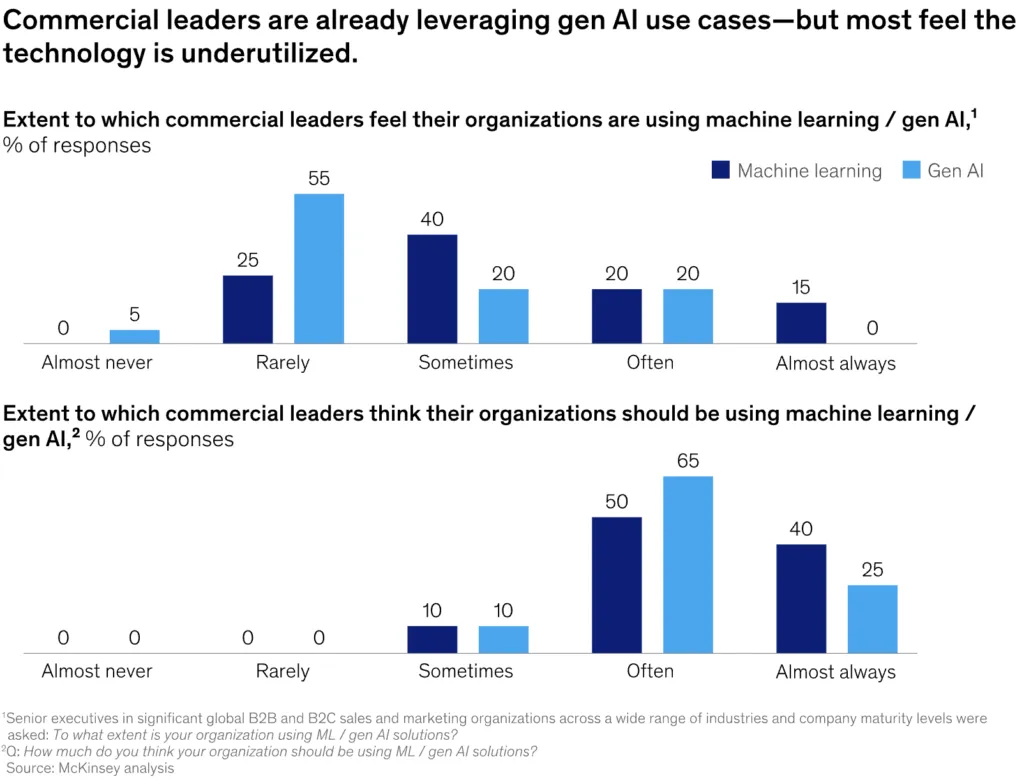Can generative AI promote a human-centered approach?
Generative AI can promote a human-centered approach in market research by analyzing data, segmenting customers, predicting trends, and automating insights.

A useful tool for companies conducting market research is generative AI, a subfield of artificial intelligence that creates new content or data from patterns and examples. Generative AI can analyze massive volumes of data, spot trends, and produce valuable insights that can help decision-making processes by utilizing the power of machine learning algorithms.
By using the power of AI algorithms, businesses may gain valuable knowledge of consumer preferences, behaviors, and needs — thus developing exact and realistic customer profiles, foreseeing market trends, and developing customized marketing strategies.
Generative AI can be applied during the product development process design and prototype stages. By looking at user data and preferences, generative AI algorithms can generate design concepts and prototypes that align with user wants. This tactic ensures that businesses develop goods that specifically cater to their target market’s wants and demands, raising customer satisfaction and producing successful product launches.
The potential of generative AI in enhancing human-centricity
Generative AI offers a lot of promise to improve how human-centric market research is for companies. It can offer insightful information and support decision-making processes by utilizing the capabilities of machine learning and natural language processing. Here are some ways that generative AI might improve market research’s human-centricity:
Data analysis and synthesis
Generative AI is capable of analyzing enormous volumes of data from a variety of sources, such as social media, customer evaluations, polls, and market trends. It can combine this data to find trends, analyze sentiment, and derive practical insights. Businesses can better personalize their products and services as a result of this deeper understanding of client preferences, wants, and attitudes.
Customer segmentation and personalization
Generative AI can also divide customers into groups based on traits, including behavior, preferences, and demographics. It can produce customized offers, information, and recommendations, assuring a more client-focused strategy. Businesses may offer personalized experiences and boost customer satisfaction and loyalty by learning about each client’s unique preferences.
Predictive analytics
Gen AI can predict future trends and consumer behavior based on historical data. It can produce precise forecasts, assisting organizations in making knowledgeable choices regarding product creation, pricing, inventory control, and marketing tactics. Businesses may match their efforts to market demands and stay ahead of the competition by utilizing predictive analytics.
Market simulation and scenario planning
It can also model multiple market scenarios based on a variety of variables, including alterations in the economy, customer behavior, and rivalry tactics. Businesses can explore potential outcomes, assess risks, and create backup plans by creating virtual environments and performing “what-if” assessments. As a result, they are more equipped to take proactive actions, respond rapidly to shifting market conditions, and reduce potential disruptions.
Automated reporting and insights
Generative AI can automate the process of producing insights and reports depending on certain research goals. It is capable of data analysis, key finding identification, and user-friendly presentation. Market researchers may now concentrate on evaluating the results, making inferences, and taking strategic actions based on the created insights because they have saved time and effort.

Ethical considerations in promoting human-centricity through generative AI
There are various ethical issues to consider while employing generative AI in market research to enhance human-centricity. Below mentioned are some of the points to be accounted for :
Informed consent
When using generative AI in market research studies, it’s important to get participants’ informed consent. Participants should be aware of the study’s goals, the intended use of their data, and any potential risks or repercussions.
Privacy and data protection
It’s crucial to protect personal information. Businesses need to ensure that the information gathered for market research is handled safely and by applicable data protection laws. To avoid re-identification, all data produced by AI models should be anonymized and pooled.
Transparency and explainability
Participants and stakeholders should be able to understand the results of generative AI models employed in market research. It’s important to explain how AI algorithms operate, how judgments are made, and what influences the outcomes.
Fairness and bias
Generative AI models may unintentionally reinforce biases found in the training data. Businesses need to deliberately reduce bias and make sure that market research projects are impartial and fair. This involves doing audits, employing diverse and representative datasets, and keeping an eye out for biases in the training data.
Limitations and boundaries
It’s important to recognize the constraints placed by generative AI models to avoid overstating their potential for market research. To prevent potential ethical issues, it is important to define the AI system’s scope and bounds clearly and to ensure that people are involved in key decision-making processes.
Societal impact
Consider the larger societal effects of using generative AI in market research to promote human-centricity. Analyze whether AI systems are being used to benefit all stakeholders or if they are escalating current disparities. Ensure that AI programs are inclusive and in line with moral standards and societal norms.
Brands should encourage human-centricity in market research, reduce potential hazards, and ensure responsible usage of generative AI technology by taking certain ethical factors into account.
Challenges and limitations of generative AI in market research
There are several advantages to using generative AI to support a human-centered approach in market research for firms, but it also has drawbacks and limitations. Let’s sift through them:
Challenges
-
Data quality and availability: Data quality and availability are issues since generative AI models need a lot of high-quality data to give accurate and dependable outputs. It can be difficult to acquire such data, particularly when conducting market research. Finding thorough and current datasets that accurately reflect the target market or consumer behavior may be challenging.
-
Transparency and interpretability: Deep learning models, in particular, can be thought of as black boxes since they frequently lack transparency and interpretability. It can be difficult to comprehend the rationale behind the generated insights, which may prevent the use of AI-derived market research in commercial decision-making processes. Building confidence with stakeholders requires transparency in how the models produce insights.
-
Lack of domain expertise: AI models could have trouble understanding the subtleties and industry-specific information needed for reliable market research. Often, essential insights are held by human subject matter experts with specialized knowledge in the sector or market that generative AI models may not fully capture. Results that are more reliable and accurate can be obtained by combining the skills of human researchers with those of AI models.
Limitations
-
Innovation and creativity: While generative AI models can produce fresh content, they might not always come up with ground-breaking ideas. These models can’t produce completely original concepts or tactics because they were trained on historical data. Genuinely creative solutions can still be produced using human ingenuity and intuition to spot rare possibilities.
-
Emotional intelligence and context understanding: Generative AI models frequently lack emotional intelligence and may have difficulty comprehending subtle nuances of human emotions, sarcasm, or cultural context. Understanding consumer feelings, preferences, and cultural quirks is a common task in market research, which can be difficult for AI algorithms to capture effectively. It is easier for human researchers to interpret and evaluate such distinctions.
-
Dynamic and evolving markets: Markets are dynamic and constantly changing, impacted by a variety of factors, including the state of the economy, improvements in technology, and social trends. It’s possible that generative AI models based on past data won’t be able to quickly adjust to these changes or effectively predict market trends in the future. Monitoring market developments and modifying research plans accordingly depend heavily on human researchers.
Wrapping up
The potential for generative AI to significantly expand a human-centered approach to commercial market research is the last point.
Generative AI can potentially be a potent tool for supporting human decision-making, enhancing human creativity, and automating repetitive jobs. It can offer fresh perspectives, proposals, and opportunities that people may not have thought of before. Generative AI can improve our talents and assist us in more effectively resolving complicated issues when paired with human ideas. However, it is not likely to completely replace human understanding.
In many areas, including creative endeavors, problem-solving, and decision-making, a collaboration between humans and AI, using the capabilities of each, is likely to be the most effective strategy.